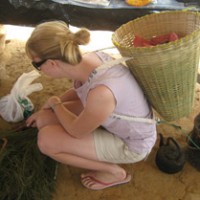Lives must continue the daily struggle, building from the ashes.
CentralWorld on May 19th, 2010 (photo credit of BBC, Reuters)
About three weeks ago, across CNN, Aljazeera, BBC and all other news networks, little more was shown than the political hubbub that was occurring in Thailand’s capital. Seen on the TV screen were fires, buildings burning, and passionate protestors dressed in the color of blood, firing at the military or throwing homemade bombs in the general direction of government offices, banks, and shopping malls, drawing attention to the situation and attracting international media on a very large scale. The government imposed strict curfews on the city that never sleeps, and citizens lined up at convenience stores, stocking up on necessities, acting as though during the Y2K conundrum.
Through a foreigner’s eyes who had never been in such a situation, the atmosphere in Bangkok during those two decisive weeks in May felt tumultuous. Offices were closed, 8 p.m. curfews were imposed every night, and a lack of clear understanding of the situation at hand led to a true feeling of being completely lost in translation, in both a political and linguistic sense. It was as though you felt you could grasp the situation, and then talking to a Thai friend about it, the perspective would change 180 degrees, finally putting you back to zero degrees all over again.
Across the world, what was seen as the final stick that got the situation burning was when the “Red Shirts” set fire to Southeast Asia’s largest shopping center, CentralWorld, burning it to the ground. This was “the end of the end”, with the symbolism representing the end of commercialism and consumerism that so well befits the “City of Angels”. Of course, the destruction of a symbol does not necessarily exemplify the reality of things. The reality being that life, particularly in Bangkok, moves very fast despite political, social and class differences, and lives must continue the daily struggle, building from the ashes.
The ashes from the burning buildings remain, but the morning after the monumental fire took place, local residents were seen joining together voluntarily to clean up the rubble. This was in itself another metaphor for the power of the will to move on despite differences; a will to improve the city and return to some sense of normality.
Asking the Thais what will happen from here, I get mixed responses. Some believe that this is only the beginning of the political struggle and that although on the surface, things in the capital have seemingly returned to status quo; what lies beneath is a much more complicated spider’s web than imaginable. As for now, the protestors have returned home. But the situation is on hiatus, since politically speaking, nothing has changed.
What is certain is that tourism in Thailand is on the decrease because media coverage of May events in Thailand seemed to have heavily influenced their perceptions of the country as a whole. Last week I was at the normally overcrowded beach resort of Phuket to find it practically void of tourists. With the European summer holidays starting now, there is a dearth of them swarming the City of Angels. Perhaps they have chosen alternative Southeast Asian destinations that have not been showered with negative media recently. Nevertheless, although it is pleasant not to be surrounded by tourists on a constant basis, it is unfortunate for the economy.
Who will sit on the spider’s nest? And what will happen when the spiders disperse?
Though media exposure remains quiet in Thailand, for now, do not be deceived. There are thousands of webs spun beneath the surface visible to the naked eye.






Read 2 comments and reply